Abstract
Cytochrome P-450 has been suggested as a mediator of the signal between depleted platelet calcium stores and an increase in plasma membrane permeability to calcium which follows depletion of the stores. This hypothesis is based on the observations that inhibitors of cytochrome P-450, such as the imidazole antifungal agents, also inhibit influx of a calcium surrogate (manganese) into calcium-depleted platelets. We tested the effects of econazole and of a cytochrome P-450 inhibitor, carbon monoxide (CO), on thapsigargin (TG)-induced platelet 45Ca2+ influx. TG specifically depletes internal calcium stores and activates store-regulated calcium influx. Econazole blocked 45Ca2+ influx when it was added before TG (IC50 11 microM). Econazole at a concentration (20 microM) that inhibited 83% of TG-induced calcium influx was not inhibitory to TG-induced calcium efflux from 45Ca(2+)-loaded platelets, and did not affect calcium fluxes in resting platelets. This econazole concentration was also inhibitory to calcium influx even when it was added after the stores had been calcium-depleted by EGTA and TG for 15 min and the signal to increase calcium influx had already been generated. Inhibition of cytochrome P-450 with CO bubbled through platelet suspensions did not change calcium influx in resting cells and potentiated TG-induced calcium influx (160% of control calcium accumulation at 20 min). This effect appeared to be concentration-dependent, such that a 5 min exposure to CO produced a greater influx potentiation than a 3 min exposure. These observations indicate that (1) cytochrome P-450 does not mediate store-regulated calcium influx, and (2) econazole probably inhibits store-regulated calcium influx by an alternative mechanism, such as interaction with plasma membrane calcium channels.
Full text
PDF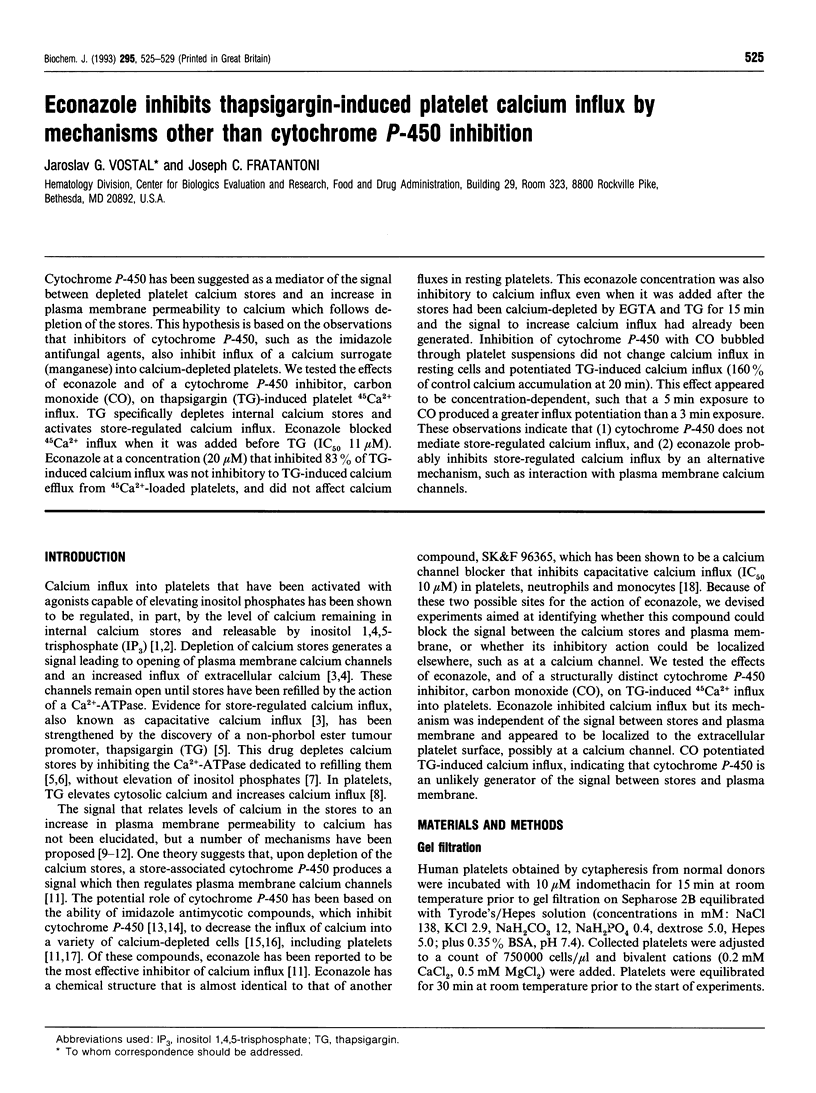
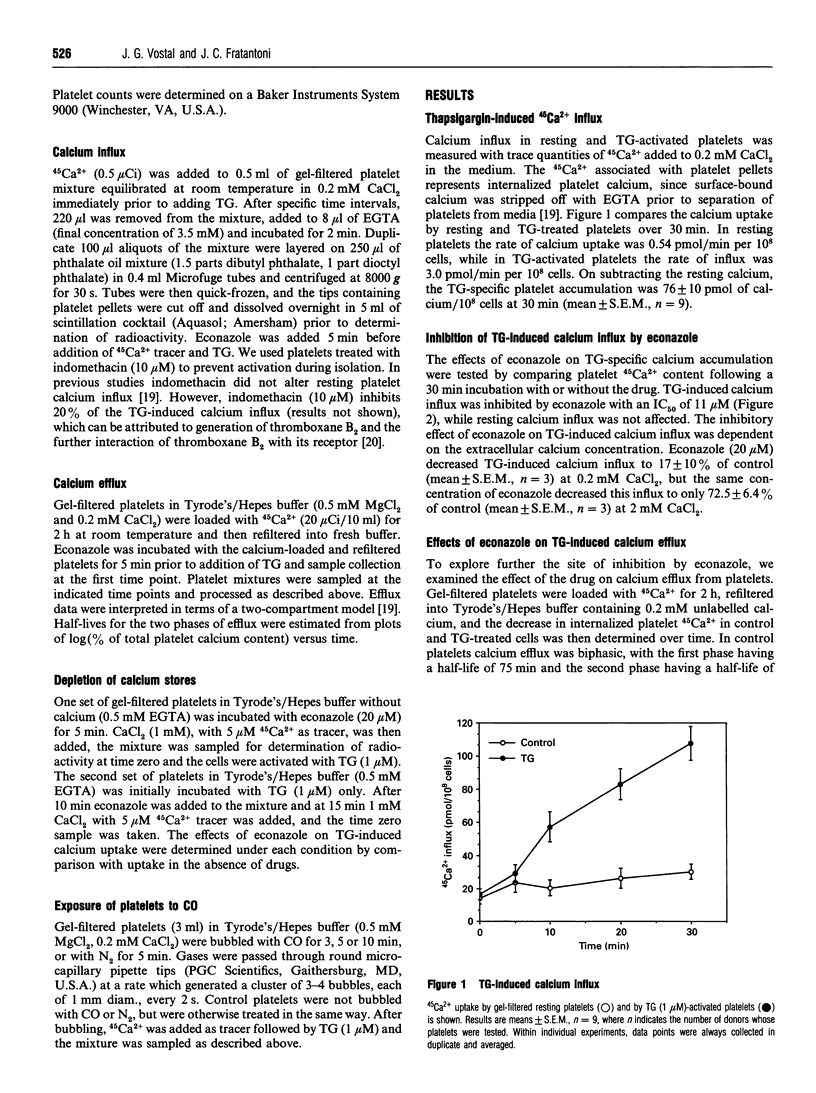
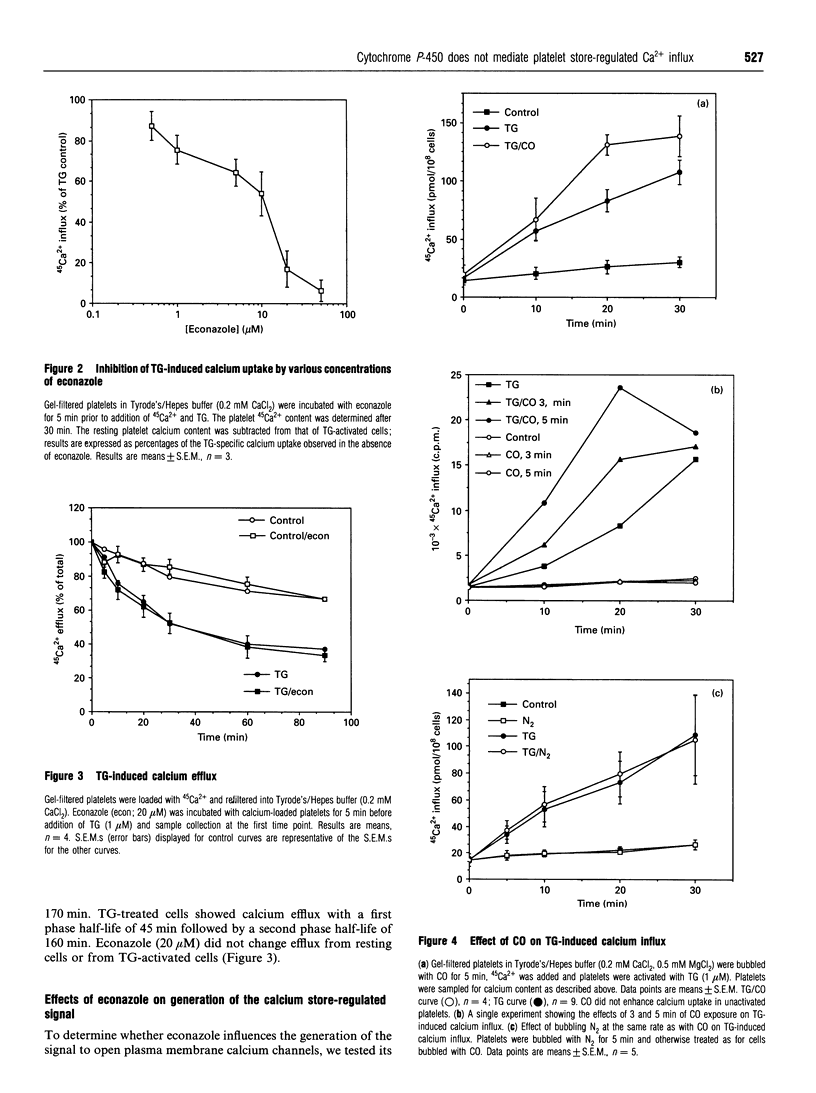
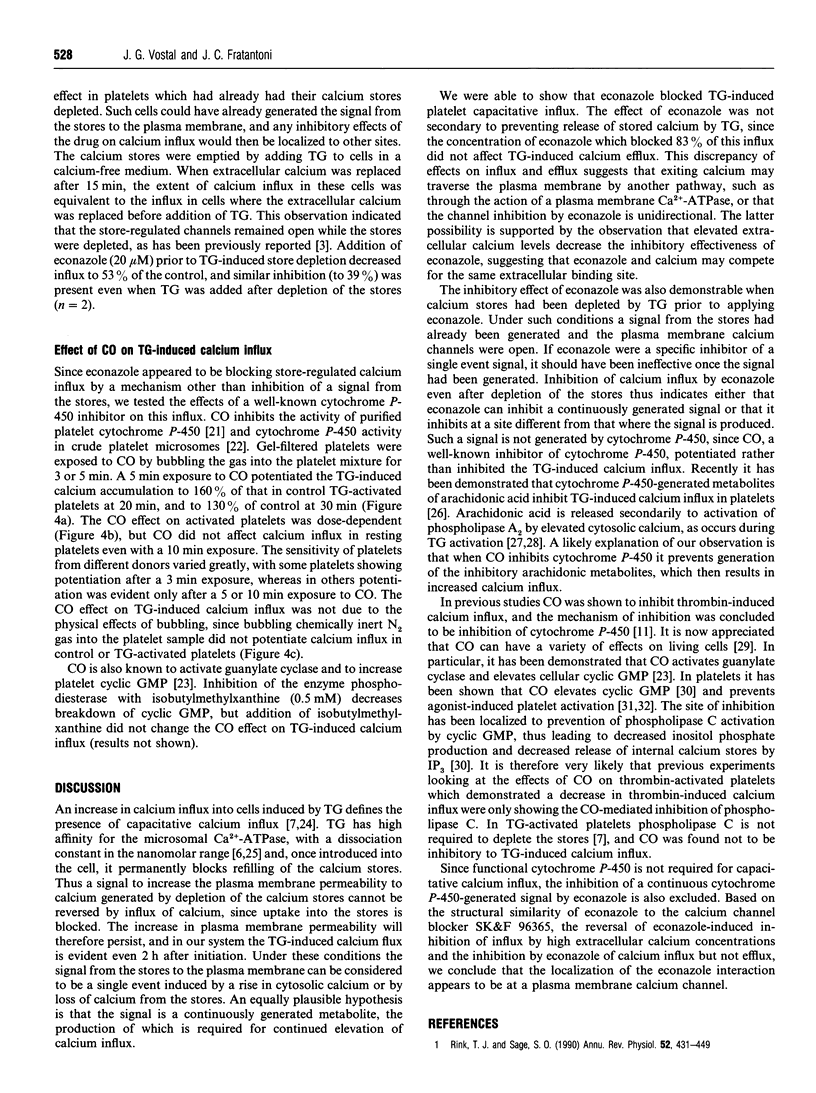
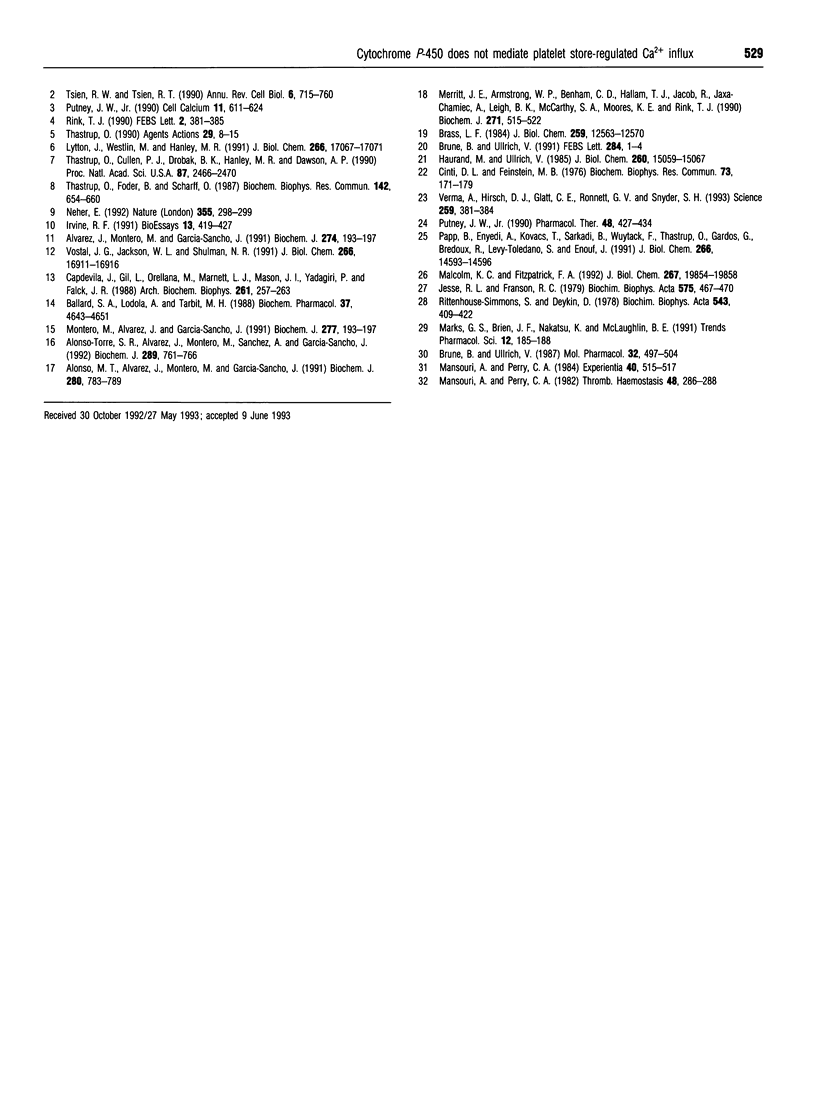
Selected References
These references are in PubMed. This may not be the complete list of references from this article.
- Alonso-Torre S. R., Alvarez J., Montero M., Sanchez A., García-Sancho J. Control of Ca2+ entry into HL60 and U937 human leukaemia cells by the filling state of the intracellular Ca2+ stores. Biochem J. 1993 Feb 1;289(Pt 3):761–766. doi: 10.1042/bj2890761. [DOI] [PMC free article] [PubMed] [Google Scholar]
- Alonso M. T., Alvarez J., Montero M., Sanchez A., García-Sancho J. Agonist-induced Ca2+ influx into human platelets is secondary to the emptying of intracellular Ca2+ stores. Biochem J. 1991 Dec 15;280(Pt 3):783–789. doi: 10.1042/bj2800783. [DOI] [PMC free article] [PubMed] [Google Scholar]
- Alvarez J., Montero M., García-Sancho J. Cytochrome P-450 may link intracellular Ca2+ stores with plasma membrane Ca2+ influx. Biochem J. 1991 Feb 15;274(Pt 1):193–197. doi: 10.1042/bj2740193. [DOI] [PMC free article] [PubMed] [Google Scholar]
- Alvarez J., Montero M., García-Sancho J. Cytochrome P-450 may link intracellular Ca2+ stores with plasma membrane Ca2+ influx. Biochem J. 1991 Feb 15;274(Pt 1):193–197. doi: 10.1042/bj2740193. [DOI] [PMC free article] [PubMed] [Google Scholar]
- Ballard S. A., Lodola A., Tarbit M. H. A comparative study of 1-substituted imidazole and 1,2,4-triazole antifungal compounds as inhibitors of testosterone hydroxylations catalysed by mouse hepatic microsomal cytochromes P-450. Biochem Pharmacol. 1988 Dec 15;37(24):4643–4651. doi: 10.1016/0006-2952(88)90333-4. [DOI] [PubMed] [Google Scholar]
- Brass L. F. Ca2+ homeostasis in unstimulated platelets. J Biol Chem. 1984 Oct 25;259(20):12563–12570. [PubMed] [Google Scholar]
- Brüne B., Ullrich V. Calcium mobilization in human platelets by receptor agonists and calcium-ATPase inhibitors. FEBS Lett. 1991 Jun 17;284(1):1–4. doi: 10.1016/0014-5793(91)80747-q. [DOI] [PubMed] [Google Scholar]
- Brüne B., Ullrich V. Inhibition of platelet aggregation by carbon monoxide is mediated by activation of guanylate cyclase. Mol Pharmacol. 1987 Oct;32(4):497–504. [PubMed] [Google Scholar]
- Capdevila J., Gil L., Orellana M., Marnett L. J., Mason J. I., Yadagiri P., Falck J. R. Inhibitors of cytochrome P-450-dependent arachidonic acid metabolism. Arch Biochem Biophys. 1988 Mar;261(2):257–263. doi: 10.1016/0003-9861(88)90340-2. [DOI] [PubMed] [Google Scholar]
- Cinti D. L., Feinstein M. B. Platelet cytochrome P450: a possible role in arachidonate-induced aggregation. Biochem Biophys Res Commun. 1976 Nov 8;73(1):171–179. doi: 10.1016/0006-291x(76)90512-x. [DOI] [PubMed] [Google Scholar]
- Haurand M., Ullrich V. Isolation and characterization of thromboxane synthase from human platelets as a cytochrome P-450 enzyme. J Biol Chem. 1985 Dec 5;260(28):15059–15067. [PubMed] [Google Scholar]
- Irvine R. F. Inositol tetrakisphosphate as a second messenger: confusions, contradictions, and a potential resolution. Bioessays. 1991 Aug;13(8):419–427. doi: 10.1002/bies.950130810. [DOI] [PubMed] [Google Scholar]
- Jesse R. L., Franson R. C. Modulation of purified phospholipase A2 activity from human platelets by calcium and indomethacin. Biochim Biophys Acta. 1979 Dec 18;575(3):467–470. doi: 10.1016/0005-2760(79)90117-6. [DOI] [PubMed] [Google Scholar]
- Lytton J., Westlin M., Hanley M. R. Thapsigargin inhibits the sarcoplasmic or endoplasmic reticulum Ca-ATPase family of calcium pumps. J Biol Chem. 1991 Sep 15;266(26):17067–17071. [PubMed] [Google Scholar]
- Malcolm K. C., Fitzpatrick F. A. Epoxyeicosatrienoic acids inhibit Ca2+ entry into platelets stimulated by thapsigargin and thrombin. J Biol Chem. 1992 Oct 5;267(28):19854–19858. [PubMed] [Google Scholar]
- Mansouri A., Perry C. A. Alteration of platelet aggregation by cigarette smoke and carbon monoxide. Thromb Haemost. 1982 Dec 27;48(3):286–288. [PubMed] [Google Scholar]
- Mansouri A., Perry C. A. Inhibition of platelet ADP and serotonin release by carbon monoxide and in cigarette smokers. Experientia. 1984 May 15;40(5):515–517. doi: 10.1007/BF01952415. [DOI] [PubMed] [Google Scholar]
- Marks G. S., Brien J. F., Nakatsu K., McLaughlin B. E. Does carbon monoxide have a physiological function? Trends Pharmacol Sci. 1991 May;12(5):185–188. doi: 10.1016/0165-6147(91)90544-3. [DOI] [PubMed] [Google Scholar]
- Merritt J. E., Armstrong W. P., Benham C. D., Hallam T. J., Jacob R., Jaxa-Chamiec A., Leigh B. K., McCarthy S. A., Moores K. E., Rink T. J. SK&F 96365, a novel inhibitor of receptor-mediated calcium entry. Biochem J. 1990 Oct 15;271(2):515–522. doi: 10.1042/bj2710515. [DOI] [PMC free article] [PubMed] [Google Scholar]
- Neher E. Cell physiology. Controls on calcium influx. Nature. 1992 Jan 23;355(6358):298–299. doi: 10.1038/355298a0. [DOI] [PubMed] [Google Scholar]
- Papp B., Enyedi A., Kovács T., Sarkadi B., Wuytack F., Thastrup O., Gárdos G., Bredoux R., Levy-Toledano S., Enouf J. Demonstration of two forms of calcium pumps by thapsigargin inhibition and radioimmunoblotting in platelet membrane vesicles. J Biol Chem. 1991 Aug 5;266(22):14593–14596. [PubMed] [Google Scholar]
- Putney J. W., Jr Capacitative calcium entry revisited. Cell Calcium. 1990 Nov-Dec;11(10):611–624. doi: 10.1016/0143-4160(90)90016-n. [DOI] [PubMed] [Google Scholar]
- Putney J. W., Jr Receptor-regulated calcium entry. Pharmacol Ther. 1990;48(3):427–434. doi: 10.1016/0163-7258(90)90059-b. [DOI] [PubMed] [Google Scholar]
- Rink T. J. Receptor-mediated calcium entry. FEBS Lett. 1990 Aug 1;268(2):381–385. doi: 10.1016/0014-5793(90)81290-5. [DOI] [PubMed] [Google Scholar]
- Rink T. J., Sage S. O. Calcium signaling in human platelets. Annu Rev Physiol. 1990;52:431–449. doi: 10.1146/annurev.ph.52.030190.002243. [DOI] [PubMed] [Google Scholar]
- Rittenhouse-Simmons S., Deykin D. The activation by Ca2+ of platelet phospholipase A2. Effects of dibutyryl cyclic adenosine monophosphate and 8-(N,N-diethylamino)-octyl-3,4,5-trimethoxybenzoate. Biochim Biophys Acta. 1978 Nov 1;543(4):409–422. doi: 10.1016/0304-4165(78)90296-9. [DOI] [PubMed] [Google Scholar]
- Thastrup O., Cullen P. J., Drøbak B. K., Hanley M. R., Dawson A. P. Thapsigargin, a tumor promoter, discharges intracellular Ca2+ stores by specific inhibition of the endoplasmic reticulum Ca2(+)-ATPase. Proc Natl Acad Sci U S A. 1990 Apr;87(7):2466–2470. doi: 10.1073/pnas.87.7.2466. [DOI] [PMC free article] [PubMed] [Google Scholar]
- Thastrup O., Foder B., Scharff O. The calcium mobilizing tumor promoting agent, thapsigargin elevates the platelet cytoplasmic free calcium concentration to a higher steady state level. A possible mechanism of action for the tumor promotion. Biochem Biophys Res Commun. 1987 Feb 13;142(3):654–660. doi: 10.1016/0006-291x(87)91464-1. [DOI] [PubMed] [Google Scholar]
- Thastrup O. Role of Ca2(+)-ATPases in regulation of cellular Ca2+ signalling, as studied with the selective microsomal Ca2(+)-ATPase inhibitor, thapsigargin. Agents Actions. 1990 Jan;29(1-2):8–15. doi: 10.1007/BF01964706. [DOI] [PubMed] [Google Scholar]
- Tsien R. W., Tsien R. Y. Calcium channels, stores, and oscillations. Annu Rev Cell Biol. 1990;6:715–760. doi: 10.1146/annurev.cb.06.110190.003435. [DOI] [PubMed] [Google Scholar]
- Verma A., Hirsch D. J., Glatt C. E., Ronnett G. V., Snyder S. H. Carbon monoxide: a putative neural messenger. Science. 1993 Jan 15;259(5093):381–384. doi: 10.1126/science.7678352. [DOI] [PubMed] [Google Scholar]
- Vostal J. G., Jackson W. L., Shulman N. R. Cytosolic and stored calcium antagonistically control tyrosine phosphorylation of specific platelet proteins. J Biol Chem. 1991 Sep 5;266(25):16911–16916. [PubMed] [Google Scholar]


